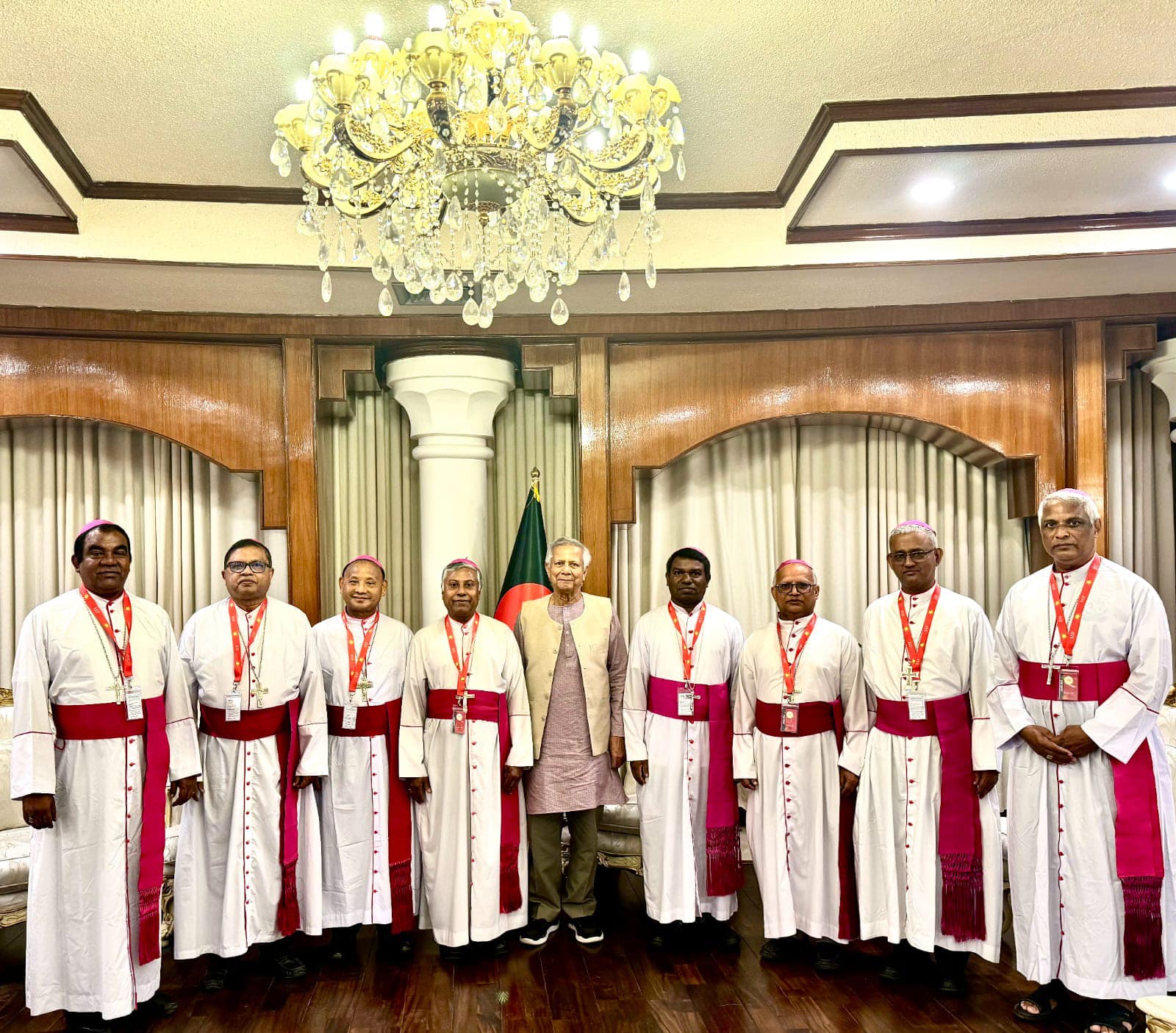Catholic bishops meet Prime Minister Yunus, offer to work together to develop the country
The interim prime minister met a delegation from the Bishops' Conference led by Archbishop Bejoy N. D'Cruze. The prelates call for a nation grounded in justice, human rights, and participatory governance. The Church's educational and healthcare institutions offer their services "regardless of caste or creed”. The bishops urge the government to simplify visa procedures for missionaries.
Dhaka (AsiaNews) – The Catholic bishops of Bangladesh paid a courtesy visit to interim Prime Minister and Nobel laureate Muhammad Yunus yesterday.
During the meeting, the prelates said that they would do their utmost to work with the authorities on national issues of greatest interest at a time of significant political transformations sparked by student protests in July and August that led to the fall and exile of former Prime Minister Sheikh Hasina.
This is result of the leadership and sacrifice of younger generations. Both the Church and the government must follow and support this unique opportunity for state reform to ensure the country’s development.
In a statement, the Catholic Bishops' Conference of Bangladesh (CBCB) notes that the visit provided an opportunity to confirm the bishops’ deep admiration for the current prime minister for his significant contributions to the country’s development and the recognition he achieved internationally.
CBCB President Archbishop Bejoy N. D'Cruze of Dhaka, OMI led the delegation.
In their address, the prelates highlighted the profound impact of global developments in science, technology, geopolitics, and climate change, emphasising the role new generations have in shaping the country's future.
“Without the active involvement of the youth, fulfilling the aspirations of the people will remain a distant goal,” they note.
Reflecting on the results of the recent protest movement, the bishops urge Prime Minister Yunus and his administration to lead Bangladesh in building a nation grounded in justice, human rights, and participatory governance.
Praising the effort made so far by the interim head of government in pursuing "secular and inclusive" ideals and principles, the bishops express renewed hope for "national unity, freedom, and well-being".
In their statement, Catholic leaders also mentioned the Christian community's commitment to the good of the nation.
“As Bangladeshi citizens, we deeply love our country and share a vision of a democratic, inclusive, and developed Bangladesh – a place of justice, rule of law, dignity, and freedom from poverty. We dream of a peaceful, harmonious Bangladesh built on friendship and brotherhood.”
The meeting underlined the CBCB’s commitment to work with the interim government for the advancement of all Bangladeshis, making a hopeful step forward for the country during this period of transformation.
The bishops also reiterated their commitment to the country, stating that they “are working tirelessly for the prosperity and development of our motherland, Bangladesh.”
They explained that “Our Church-run educational institutions provide quality education and holistic development for young people, regardless of caste or creed.
“Our hospitals and health centres extend vital care to the poor, while Mother Teresa’s homes offer a place of trust for the destitute, disabled, and street children. Additionally, our welfare institutes empower marginalised women through handicrafts, promoting equality and economic independence.
“Together with Christian organisations like Caritas Bangladesh, World Vision, HEED Bangladesh, and CCDB, we are actively contributing to the development of the nation and the welfare of its people. With all our services, we are dedicated to supporting the vision of this government and the dreams of the people.”
The statement also highlights the importance of constitutional reforms that promote nationalism, secularism, non-communal values, and human rights; hence, they urge the government to formally recognise the country’s 45 indigenous communities, ensuring their equal rights, and addressing the complexities of their land rights.
Lastly, the bishops requested that Christian public holidays be expanded beyond 25 December (Christmas) to include 24 December (Christmas Eve) and Easter Sunday, allowing Christians to fully observe these significant days.
They also highlighted the challenges faced by the approximately 170 Catholic missionaries currently in the country, who face complex and lengthy visa procedures, concluding with an appeal for a simplified and expedited visa process to enable them to continue the service without unnecessary delays.







.png)










